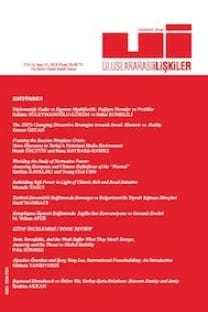Uluslararası Mülteci Rejimi: Afganistan Örneği Üzerinden Bir Rejim Etkinliği Analizi
Uluslararası mülteci rejimi, 1990’ların başından itibaren gönüllü geri dönüşü en çok tercih edilen kalıcı çözüm olarak benimsemiş ve 2002 yılından itibaren de, 4R programı kapsamında menşe ülkedeki faaliyetlerini arttırarak, bu dönüşlerin sürdürülebilir olmasını sağlamayı amaçlamıştır. Rejimin uyguladığı bu “çözüm” stratejisi, literatürde olumlu ve olumsuz çeşitli yorumlarla değerlendirilse de, rejimin bu stratejideki başarısı analitik olarak incelenmemiştir. Bu çalışma rejim etkinliğini, 2002–2010 yılları arasında Afganistan’a yapılan toplu dönüşleri, gönüllülük esası ve sürdürülebilirlik bakımından inceleyerek sorgulamaktadır. Analiz, uluslararası mülteci rejiminin Afganistan örneğinde etkin olmadığı sonucuna ulaşmakta ve daha etkin bir mülteci rejimi için devletlerarası işbirliğinin ortak çıkar yerine ortak insani bilinç temelli olarak tanımlanmasını önermektedir.
Anahtar Kelimeler:
Uluslararası Mülteci Rejimi, Birleşmiş Milletler Mülteciler Yüksek Komiserliği, Rejim Etkinliği, Gönüllü Geri Dönüş, Afganistan
International Refugee Regime: An Analysis of Regime Effectiveness through the Afghanistan Case
The international refugee regime has promoted the voluntary repatriation as the most preferred durable solution since the beginning of the 1990s and aimed to provide sustainability of these repatriations through increasing its activities in the countries of origin under the notion of 4Rs since 2002. Though there are positive and negative arguments regarding the “solution” strategy in the literature, the success of the regime on this strategy has not been examined in an analytical way. This article analytically questions regime effectiveness in terms of voluntariness and sustainability, through examining mass repatriations to Afghanistan between 2002 and 2010. It concludes that international refugee regime is not effective in the Afghan case and for a more effective refugee regime, it suggests an interstate cooperation based on common humanitarian consciousness, rather than common interests.
Keywords:
International Refugee Regime, UNHCR, Regime Eff ectiveness, Voluntary Repatriation, Afghanistan,
___
- .....
- ISSN: 1304-7310
- Başlangıç: 2004
- Yayıncı: Uluslararası İlişkiler Konseyi Derneği İktisadi İşletmesi
Sayıdaki Diğer Makaleler
Uluslararası Mülteci Rejimi: Afganistan Örneği Üzerinden Bir Rejim Etkinliği Analizi
Adam HANIEH, Körfez Ülkelerinde Kapitalizm ve Sınıf
Macaristan Merkez Bankası Reformunun Oluşum Sürecinde Avrupa Birliği ve Macar Hükümetlerinin Rolü
Dış Politikayı Analiz Etmek: Dış Politika Analizinde Yapan-Yapı Sorunu
Halit Mustafa Emin TAĞMA, Meltem MÜFTÜLER-BAÇ, Ezgi UZUN
Osmanlı-Rus İlişkilerinden Bir Kesit: 1826 Akkerman Andlaşması’nın “Müzakereleri”
